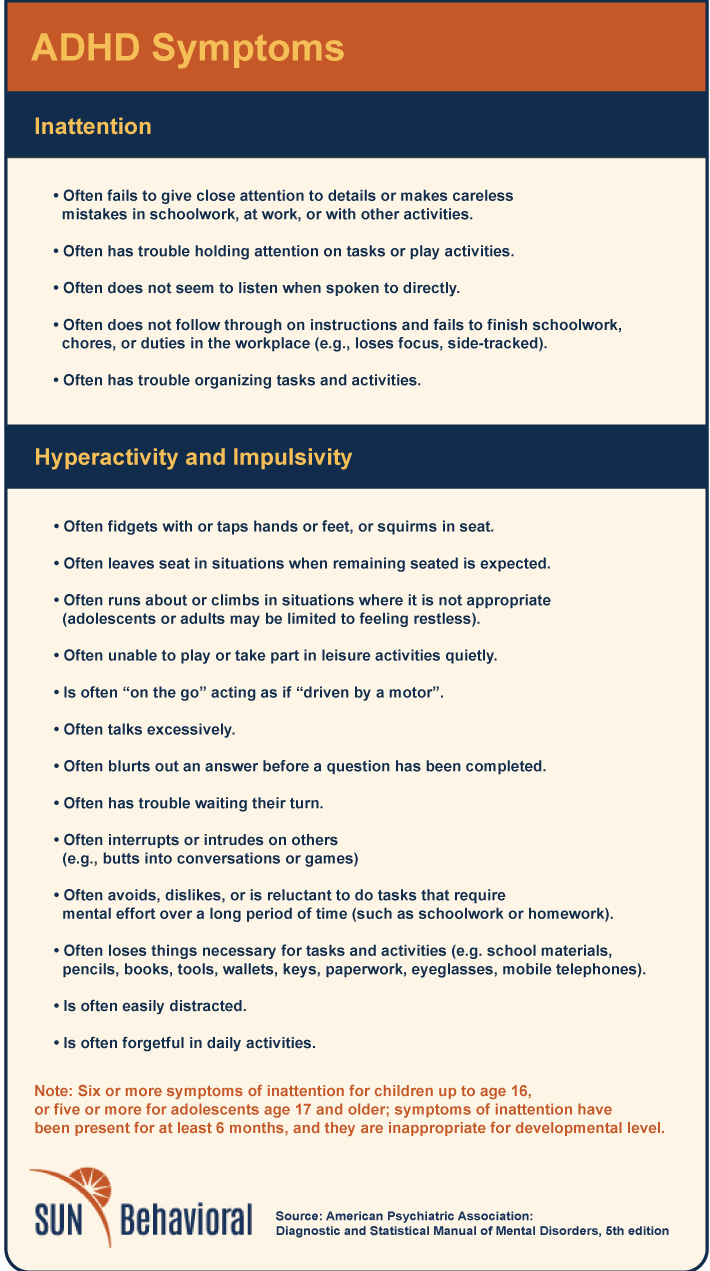Services
- Home
- Mental Health Services
- Who We Treat
- How We Treat
- Patients & Visitors
- About
close
We all want the best for our loved ones and to help them build strong futures. SUN Behavioral keeps its core values at the forefront to assist teens in Houston and the surrounding communities with therapeutic adhd treatment programs to meet their unmet needs.
What are these values?
Our top priority for our adolescent patients and their families is education about attention-deficit/hyperactivity disorder (ADHD) that will enhance your lives and deliver a positive outcome.
Great question! Obviously, you’re noticing behaviors, or maybe a teacher has brought it up in a conference. A key part is a consistent pattern of behavior. Is it always happening at the same time of day? Throughout the day? After a long period of inactivity? During a specific school class does the teen struggle with understanding? While taking tests or exams? Occurring for a long period?
This can be frustrating for the teen as well as the parent. “Why can’t they just do the work or not have to act up?” the parent might wonder. “Why can’t I control myself? My friends are really getting annoyed with me and my outbursts,” the teen, visibly frustrated, sobs into their pillow.
No schoolwork is going to get done in this atmosphere. Excuses once again will have to be made to the teacher and the student falls further behind their classmates. Something has to give. But what? How?
As a parent, your first step can be to reach out to a healthcare provider for some direction. Your primary care doctor may be comfortable in this area or suggest you consult with a psychologist or psychiatrist familiar with adolescent behavioral health.
A diagnosis of ADHD can come from a general practitioner, like your family doctor, or a mental healthcare professional such as a psychologist or psychiatrist. There is not a diagnostic test as much as a multi-step evaluation to determine the presence of general symptoms.
You may have heard your school guidance counselor or primary care doctor refer to the Vanderbilt Assessment Scale. This is a 55-question assessment that oftentimes a parent is directed to have teachers complete and is then returned to the doctor for scoring. It is a tool that can show the commonality of certain behaviors but is a part of a diagnosis and not the only piece. It is also more commonly given for children ages 6-12 and not the adolescent or adult age categories.
As your teen grows into young adulthood, having someone advocate for their interests during the in-between stages of childhood and adulthood is key. Our Adolescent Psychiatry Program was created specifically for ages 13-17 and their specific behavioral health needs.
Attention-deficit/hyperactivity disorder is a neurodevelopmental disorder typically characterized by difficulty paying attention, acting impulsively, and being overly energetic.
Granted, a person with ADHD may initially find everyday skills or school learning challenging to navigate. Their family can also feel the frustration in the home environment as general tasks go undone, or the school calls yet again to report disruptive behavior or falling grades.
As they receive a formal diagnosis and receive treatment, these struggles can turn to success as they learn tools to manage their symptoms. And a family can grow closer handling something together and learning to accept each other for their unique selves.
Many well-known people who are diagnosed with ADHD can live successful lives. Look at Olympians Michael Phelps and Simone Biles. Students can thrive in gifted academic programs as well and even prove advantageous due to the skills learned to train their brains. Famed 20th-century neurosurgeon Harvey Cushing was also an artist known to document the internal structure of the skull and brain by making drawings immediately following procedures.


ADHD is one of the most common childhood disorders and typically lasts through adulthood. According to the 2016 National Survey of Children’s Health, more than half of the 6.1 million people of all ages diagnosed are between the ages of 12 to 17.
It is more common for boys (14% diagnosed) than girls (5.6% diagnosed.) Managing this neurologic chronic disorder typically involves medication, therapy, and school adjustments (see below).
We’re back to the original question asked in the beginning. There are several misconceptions about ADHD terminology among the public so it is important to understand the clinical terms surrounding this disorder.
There are three types of ADHD, and we’ll visit those symptoms shortly. You are probably familiar with quite a few in your experiences but may not realize that several must be present before a diagnosis can be considered. Also, there may be other disorders present as well as ADHD.
After the evaluation above, additional symptom criteria must be met, such as
The teen will be evaluated to ensure that there is no other behavioral disorder that should be considered as well. According to the national survey, 60% of children diagnosed with ADHD also experienced another disorder, such as anxiety, depression, behavior issues, or autism.
Evaluation is a multistep process, and we can help you get started in the right direction with SUN Behavioral Houston’s Telehealth Consultation, which can be scheduled online at no cost.

If you are looking for teen counseling in Houston to help manage ADHD or other mental issues, we encourage you to reach out to SUN Behavioral Houston. Our Adolescent Psychiatry Program is specific for teens, and we also offer a Children’s Program for ages 6-12, both to help build strong futures. Our values are the core of our mission to provide mental health services for our patients and their loved ones. Call us today at 713-796-2273.
Medication
Common medications include the brand names Adderall®, Ritalin®, Vyvanse®, and Concerta®, all forms of dexmethylphenidate, dextroamphetamine, lisdexamfetamine, or methylphenidate. It may sound counterintuitive to give a stimulant to a highly stimulated teen, but the medication stimulates the focus factor.
Medications are not always considered appropriate. If they are pursued in treatment, they are given at the lowest dose (which may increase with time) or another medication that may interact better, as seen with time. Activities are also considered due to potential side effects. For example, you wouldn’t want a student driver to be taking something that might cause drowsiness.
Behavioral Training Therapy
Behavioral therapy will have a family education approach at SUN Behavioral Houston, with a focus on behavioral training. This is learned by parents and teens to help the patient achieve success at school, home, work, and in the community.
Through therapy, your child will learn skills like waiting their turn, how to manage tasks, and other helpful solutions. These and others can be practiced at home.
Other helpful tips to help manage ADHD
We will also provide maintenance to see that the patient is showing improvement with medications, therapy, and school adjustments. Continuing to identify a path that works for managing ADHD is an ongoing process.
School Adjustments
School accommodations are common as well with independent education plans (IEP) developed between the parents and the school district, with access to special services if offered by the school. Small adjustments are extremely helpful and can include taking a planned walk mid-day or testing in a quiet environment with supervision.
Treatment begins with a proper assessment and diagnosis from a general practitioner or mental health professional. Upon diagnosis, medication, behavioral therapy, family therapy, and school adjustments are typical courses of action. A structured schedule, healthy foods, proper sleep, encouragement, and behavioral skills to practice (such as task management) are incredibly beneficial.
Foods with caffeine and sugar should be avoided. Keeping that in mind, you also want to avoid sugar spikes due to unstable glucose levels. Other foods have been proven to reduce symptoms, such as protein and complex carbohydrates to avoid sugar spikes. Foods with omega-3 fatty acids such as walnuts and chia seeds will boost omega levels for heart and brain health, which can tend to be lower in people with ADHD.
ADHD is chronic, but there are different stages of life and therefore differences in symptom presentations. Generally, as people grow older and slow down, so will symptoms of hyperactivity.
According to the Centers for Disease Control and Prevention, stimulants provide the most effective treatment of ADHD symptoms. Training parents with behavior management skills is generally recognized as the first approach to children under age 6.
The capable team at SUN Houston has been serving our community for years. Reach out to begin your journey to recovery.